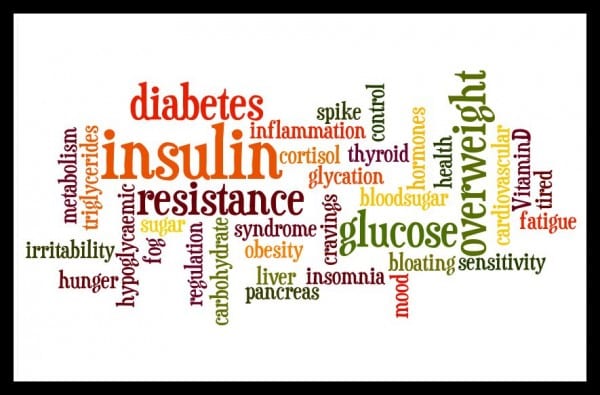Insulin resistance isn't something you're likely to be worried about. You might not even know what it is. But if you're menopausal (ie over 40), it's definitely something that you might be experiencing without knowing it!
If you're gaining weight without changing your diet, or if you're suffering from common menopause symptoms such as fatigue, brain fog, mood swings, anxiety, joint pain, insomnia, headaches, yes it can be due to fluctuating sex hormone levels, but you also need to consider that you may have elevated levels of insulin.
As well as blood sugar swings which will drain your energy, store more fat, mess with your mood, give you constant cravings and fog up your brain, chronically high insulin is a huge stress on the body and a major health risk.
You can watch the video below or listen to the podcast.
What is insulin resistance?
Insulin is released from your pancreas when you eat food containing sugar (not just the sweet stuff, carbohydrates are just more complex sugars). Once the sugar is absorbed into the blood, insulin mops up the excess and takes it to the cells of your liver and muscles to help move the glucose inside to use as energy. The cells take what they need and the rest is stored in your fat cells for future use.
Insulin resistance happens when your cells become less sensitive or receptive to insulin. They can't keep up with all the carbs and sugar coming along! The insulin receptors on your cells shut down, and that leads to more insulin production to try to deal with the extra unwanted sugar.
It's also often called Metabolic Syndrome, pre-diabetes or hyperinsulinemia, and can have a major influence on common female conditions such as menopause, PMS, PCOS, endometriosis, infertility, acne and more.
The Stress Effect
Even if you're on the best blood sugar balancing diet in the world, you can still be at risk of insulin resistance! That's because stress can cause it on its own.
As well as directly putting sugar into the blood (for your fight or flight response), cortisol can prevent insulin from doing its job of transporting glucose into cells.
Why are we more at risk in menopause?
Women going through peri-menopause and menopause are more prone to insulin resistance. This is due to metabolic changes related to adrenal, thyroid and sex hormone fluctuations (particularly oestrogen) and increased difficulty in tolerating carbohydrates.
Whether it's due to a slower metabolism, increased fat to muscle ratio, being less active or more stressed, we just can't handle carbs like we used to!
What risk factors to look out for
- High Waist:hip ratio (although you don't need to be overweight to have insulin resistance)
- High blood pressure
- High cholesterol or triglycerides
- Elevated HbA1c
- Feeling tired, ‘hangry' or dizzy if you don't eat
- Excessive thirst and/or frequent urination
- Constant sugar or carb cravings
- Family history of T2 Diabetes
- Diagnosed PCOS or Endometriosis
- Acanthosis Nigricans (darkened skin patches on the neck and armpits)
What about other health risks?
Too much insulin can;
- interfere with ovulation
- cause PCOS by stimulating more androgen production
- increase inflammation
- lead to more serious conditions; eg Type 2 Diabetes, heart disease, cancer and dementia
- accelerate ageing – all that sugar in the blood causes ‘glycation' – sticky blood causing damage and ageing!
How to balance insulin
The GOOD news is that you can lower your risk of insulin resistance, and even reverse it through your diet and lifestyle.
Balance your blood sugar;
- Limit refined carbs, sugar and alcohol
- Eat more vegetables, protein and healthy fats – follow a Low GL diet
- Limit snacking, stick to 2 or 3 meals a day
- Try overnight fasting
Exercise;
Make sure you're active but not over-exercising. Strength training will help to maintain muscle mass which helps to store glucose, so the more muscle you have the more glucose you can store, with the result that the production of insulin is minimized.
Stress Management;
Balancing your stress hormones is essential to maintaining good blood sugar balance. Make self care and stress management a non-negotiable priority on your to do list!
Sleep
Your daily Circadian rhythm is vital to healthy insulin management. Prioritise sleep, make sure you get some daylight when you wake up, and wind down at night (especially avoiding gadgets and artificial light). so that your body gets the right messages to make the right hormones (including serotonin and melatonin).
Supplements;
Certain nutrients are very helpful in managing your blood sugar and increasing insulin sensitivity;
- B vitamins (especially B3, B6 and biotin)
- Chromium
- Magnesium
- Zinc
- Alpha Lipoic Acid
- Curcumin
- Berberine
- Vitamin D
Do visit my collection of recommended brands at Approved Vitamins.
Testing
Start with your HbA1c levels. The doctor can test this for you. Other tests might include your fasting insulin, or glucose tolerance tests.
Or if you are wanting to track your blood sugar levels to see how your diet and lifestyle is affecting you, this is a great App and sensor that you can try for free for 14 days.
And if you want a comprehensive look at all your hormones, do contact us for more info.

